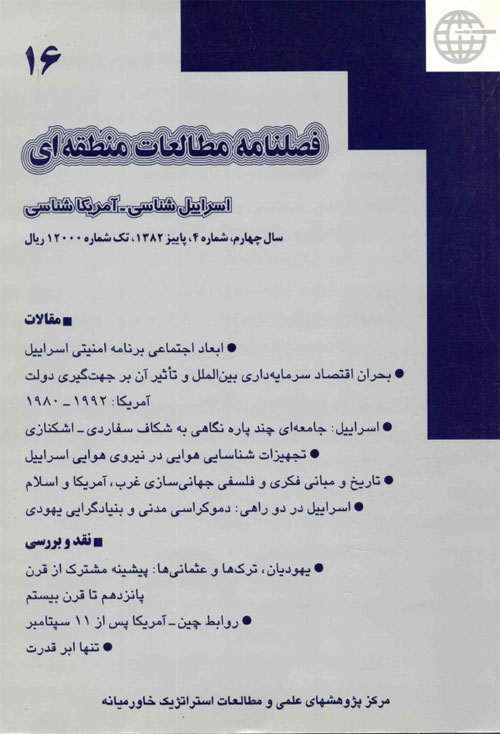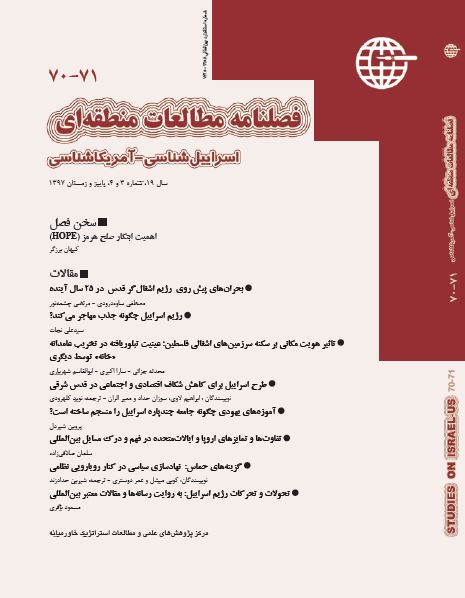فهرست مطالب

نشریه مطالعات منطقه ای
سال چهارم شماره 4 (پاییز 1382)
- اسراییل شناسی - آمریکا شناسی
- تاریخ انتشار: 1382/09/20
- تعداد عناوین: 9
- مقالات
- نقد و بررسی
-
صفحه 171
-
صفحه 175
-
Page 1The mechanism for coordination of nature of Israels security plan has made many existing debates within Israeli society. Drawing past experience of confronting with opposition groups both within and outside of the occupied territories, Israel shaped a new agenda in which its situation improved relatively comparing the former one. Regarding this fact, this article proposes the Israels security plan in the 21st century. Analyzing two main pillars of the Israels security plan, the author studies possible strategies to deal with domestic and foreign obstacles by Israel. This article only considers social aspect of the Israels security plan and it is at the cross-section of sociology and security studies from a methodological perspective. In other words, it uses the sociology of security which is one of the new trends in security studies field. It can demonstrate a better picture of the Israels security plan together with economic and military aspects of aforementioned plan.
-
Page 21This article studies one of the most influential factors in U.S. administrations, policy-making, that is the crisis of international capitalist economy. Since the 1980s because of declining productivity rate, the capitalist system has experienced a new crisis. Under these
circumstances, decreasing wages was a priority for American capitalist class, and the Reagan and Bush administrations tried to increase their interests by decreasing welfare expenditures. But the administrations failed to reach their economic aims and could not
overcome economic stagnation. This article demonstrates that the Bush and Reagan administrations rightist policies were motivated by new crises in U.S. economy. They began to decrease state welfare expenditures and attempted to meet capitalists priorities in new economic condition by creating economic discipline. -
Page 49Israeli society is made of Sephardim and Eshkenazi Jews that have their particular socio-cultural features. Considering their specific music, accent, literature and history, both of them can deepen social cleavages in Israeli society. Since todays social cleavages in Israeli society include ethnic, religious and even class cleavages, then this article studies the
subjective, objective, economic, social, cultural and political aspects and appearances of Sephardim- Eshkenazi cleavage. This issue and its impact on Israeli society is investigated by quantitative and field study methods. Regarding Sepharadim-Eshkenazi ethnic struggle, the author concludes that the gap between them has deepened and improved. In contrast with notions of decreasing ethnic gap in Israel, the author believes that it will persist. -
Page 73Israeli air force is armed with many types of fighters, bombers and ballistic missiles that can carry nuclear shells. Mirages have spicific importance because of their capability to adapt with different types of their operations. F-4E planes and their RF-4E models that are capable of taking photographs and borne identifying things have improved Israeli air defence capabilities. Regarding the importance of air borne reconnaissance systems and capabilities in Israeli airforce, this article seeks to study this issue. Considering Israeli
statesmens sensitivity to obtain intelligence from surrounding environments, near and distant neighbors and Palestinian militants, the possession of these systems provides Israeli airforce, with superb and sometimes unique capabilities and functions and makes it the most powerful among Israeli forces. Regarding the evolutionary trajectory of airborne reconnaissance equipments in Israeli air force, this article investigates the most important ones. -
Page 85Although the discussion and dialogue of globalization have begun more than one decade ago, it is still an ambiguous concept. This ambiguity is evident in questions such as what means globalization? What are its roots and origins? What is its philosophical foundation?
What is the connection between globalization and Islam, the United States and the West? Although there have been many answers to these questions, these very answers have created new ambiguities because of their diversity, differences and lack of transparency. Therefore, any attempt to give a cohesive and clear image of globalization would help to clarify the ambiguities of globalization debate. The author tries to
study the history, philosophical and conceptual foundations of globalization in the Western countries and particularly U.S.A by addressing a clear definition of globalization and comparing it with Islamic reading of it. He also attempts to assess the efficiency and
success of globalization according to Islamic and Western fundamentals. -
Page 141Manistream Zionism (now comprising both Labor and Likud) is increasingly being challenged by the Right and Left. Post-Zionism has exposed the intellectual fallacies underlying traditional Zionisms attempt to combine ethnic segregation with an open society, but it is the moral and ideological substitute offered by neo-Zionism, opting for
ethnic segregation as an ultimate goal, that is mounting the real political challenge. This article argues that while mainstream Zionism will delineate the space of a future Israel (by drawing the borders in a settlement with the Palestinians), the neo-Zionism will cast the
ideological content into this space (by defining the identity and orientation of Israeli society).


